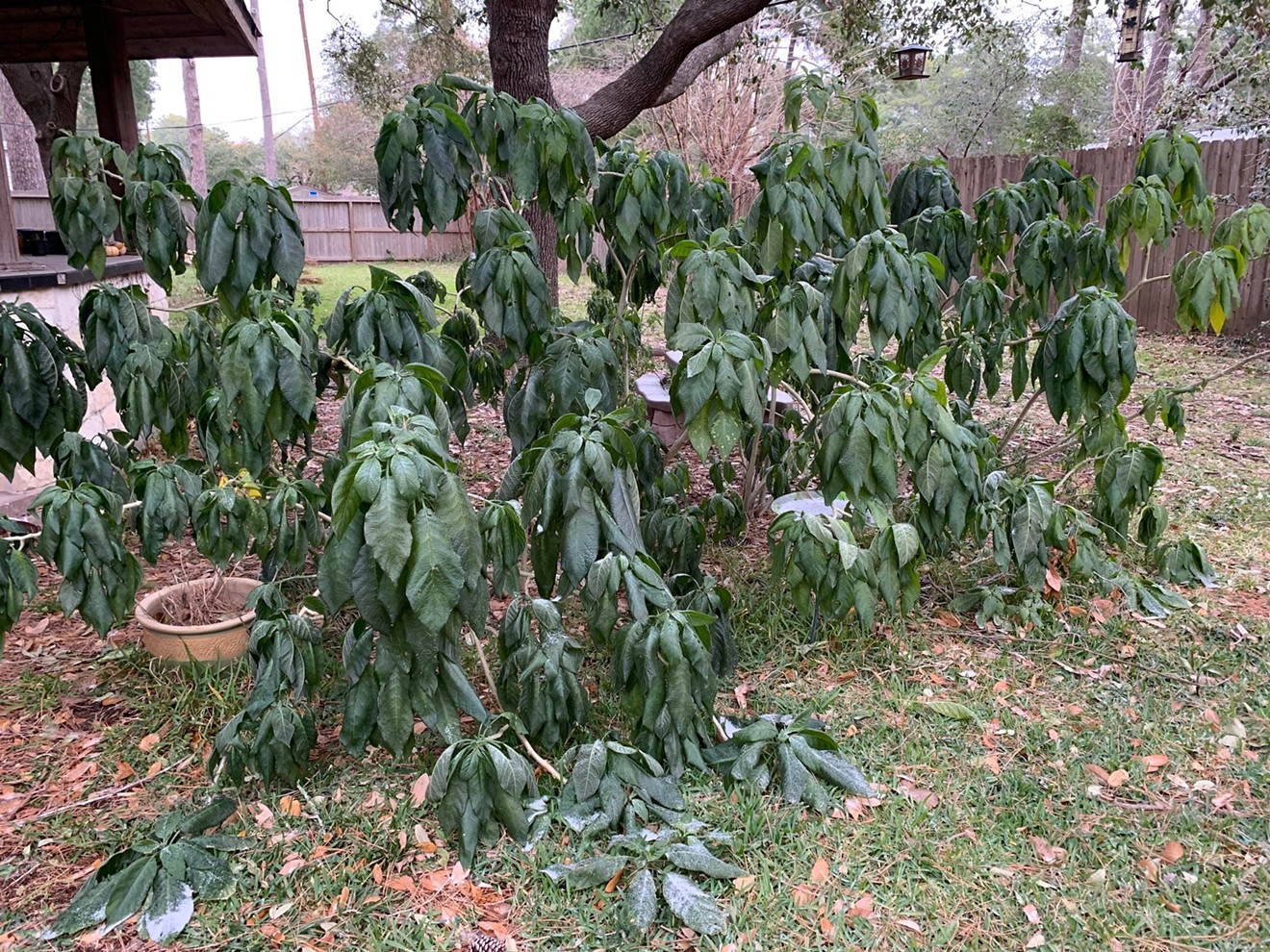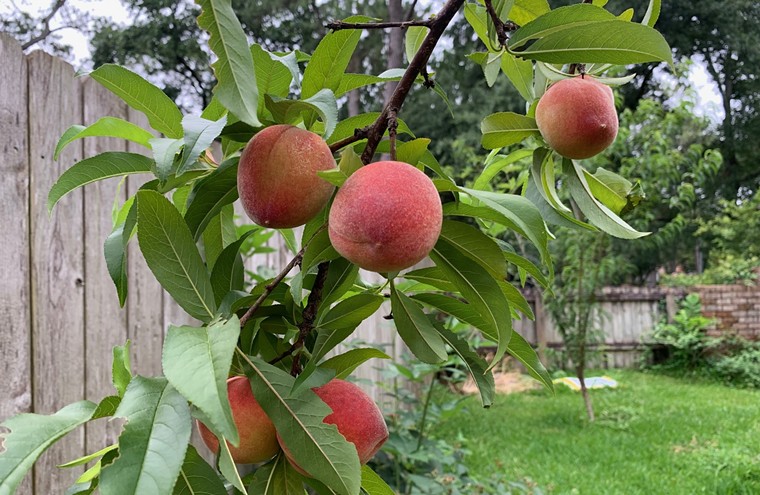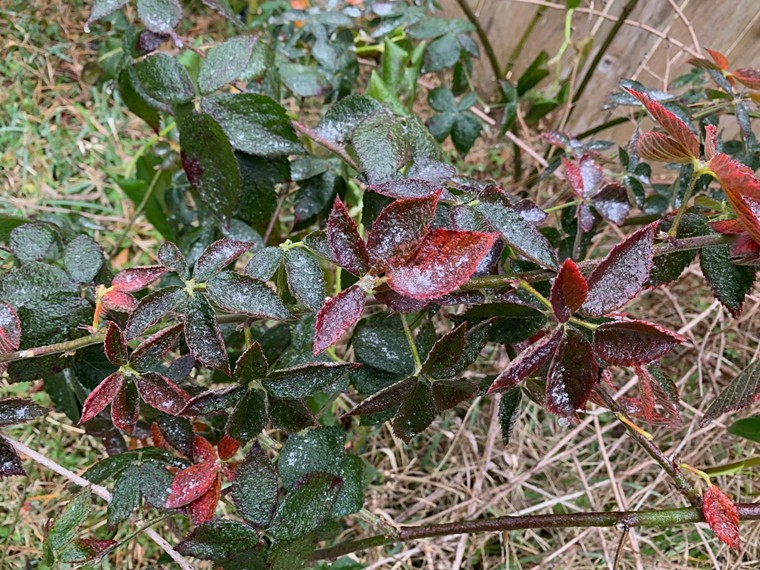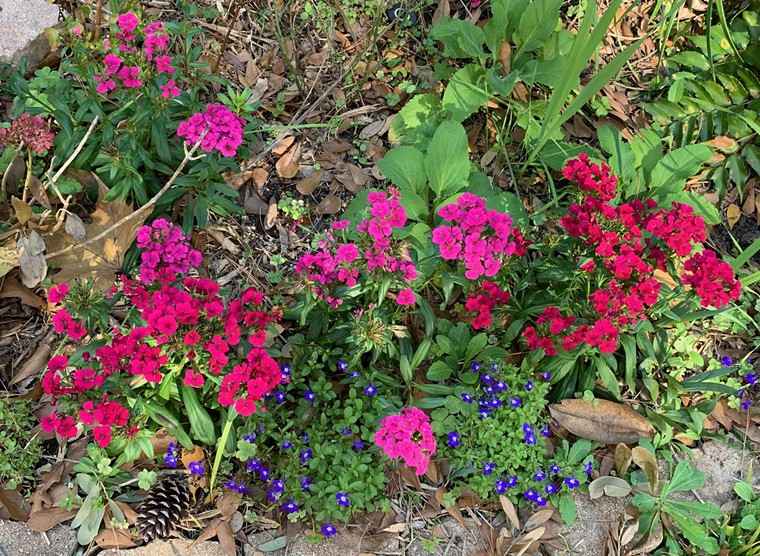Whether you're a down and dirty devoted digger of the earth or a homeowner who focuses on curb appeal, gardening in Houston can take its toll, financially, physically and emotionally. We made it through one of the most brutal summers in recent memory with 100 degree temperatures and exceptional drought in 2023 only to be slapped back by an arctic front and hard freeze this week. First and foremost on homeowners' minds were wrapping pipes to ensure that this freeze wasn't a repeat of Winter Storm Uri in February 2021. That winter storm left us in single digit temps and strained the grid to its breaking point, leaving many Houstonians without electricity, resulting in a multitude of burst pipes and worse.
While non-gardeners may be enjoying a couple of days off work or school due to the inclement weather, those of us who love our floral friends are gazing sadly at the pitiful specimens that only days ago were springing back to life. At least that is the case in my little Eden.
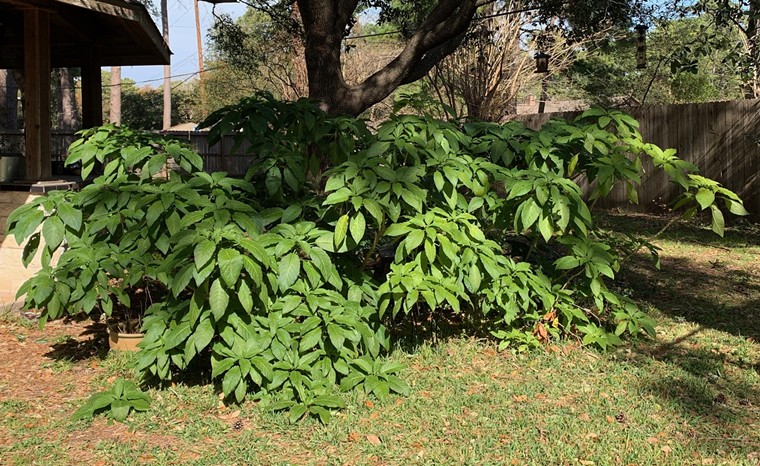
Angel's Trumpet can get massive under the right conditions. Until there's a freeze.
Photo by Lorretta Ruggiero
Then, the meteorologists of Houston began to forecast an arctic front that would destroy all the greenery and blooms that were making me dream of a suburban paradise once more. Just like Texans fans who never give up hope that their Super Bowl fantasies will come true, we Houston gardeners hold close to our hearts the hopes of a perfect gardening year, even though our supposedly temperate climate is anything but. With this current freeze and another one on the way, it looks like the odds for the Texans, with their rookie lineup, may be better than our chances for an early spring garden.
So, what are the odds for our landscapes, flower beds and vegetable gardens after this freeze? Well, we have a few predictions, though we wouldn't put money on it. Some will come out as champions, others will bite the dust. And some plants will string gardeners along with promises of a new season.
Roses, Azaleas and Other Shrubs:
Despite their finicky reputation, roses are actually quite hardy plants when it come to cold weather. Most are good down to 20 degrees and even then, they are fine as long as the freeze is not extensive. Because of our climate in Houston, most grafted roses have their bud union planted above ground. For more delicate specimens, mulch or straw can be mounded against the bud graft to provide a little extra protection. Roses may lose leaves during the freeze but since they are dormant right now, it won't really affect them. Knockout Roses are even more hardy and are fine down to 10 degrees without protection.
Azaleas can even withstand colder temperatures so there is no need to cover them, including the Encore varieties. Most of the damage done to azaleas this year was caused by the drought and heat of the summer. Evergreen shrubs were also affected by this past summer but the freeze will do them little harm.
Odds of survival for roses and azaleas is 99 percent. We also think roses will enjoy the dormancy, allowing them to bloom stronger in the spring.
Fruit Trees and Plants:
While most trees fare well in cold weather, many fruit trees have particular requirements, especially citrus. For peaches, cold temperatures are actually necessary to set fruit. The term for this is 'chill hours' and different varieties have varying needs. Most peaches grown in Texas require 600 chill hours or less. And the primo time for this is before mid-February. After that, a frost will likely damage buds.
Citrus fruit trees, however, are grown in U.S. Zones 9 and 10 for a reason. And even our Zone 9 can be a bit too cold for them. Some lemon and orange varieties can withstand temps down to 26 degrees but they don't particularly like it. Satsumas are grown in home gardens because they are a little hardier, down to 20 degrees. Grapefruit may be safe south of Houston, but my brother-in-law lost a 30.0-year-old tree during Uri, down in Sugar Land. Limes are some of the least hardiest citrus and should be grown in pots and taken indoors. They prefer temperatures upwards of 40 degrees. My Mexican key lime tree is safely ensconced under the skylights of my living room.
My thornless blackberries made it through Uri so I think they will be fine for this hard freeze. And blueberries should be okay, as well. Strawberries are less likely to return if it gets below 20 degrees. Because strawberries grow low to the ground, they can easily be covered for added protection.
So, peaches, blackberries, blueberries and satsumas have great odds of emerging victorious. Citrus fruits have a 50-50 chance if it doesn't stay below 26 degrees for too long. It will probably be the end of the road for most lime trees if not brought inside.
Perennials:
Coneflower, blanket flower, chrysanthemums, phlox and gerbera daisies are common perennials in Houston gardens. Less common are biennials like delphiniums, foxgloves and columbine because of our warmer weather. However, if planted in the fall, many of these perennials and biennials will do just fine when spring comes, rewarding forward-thinking gardeners with showy blooms. They are the flowers most of us picture when we think of an English garden.
For gardeners who gamble on these, the payoff is worth it.
Bedding Plants:
Every season in Houston brings a new selection at nurseries of annuals to add color to flower beds and hanging baskets. In fall and early winter, dianthus, lobelia, mums, snapdragons and pansies make home owners and flower lovers spend big bucks and for good reason. They bloom for long periods and are pretty hardy. Many of these cold weather annuals can actually survive down to 20 degrees. They make look a little worse for wear but they'll hang on and bloom when the weather warms up again.
The spring and summer annuals such as zinnias, cosmos, Mexican heather, petunias, purslane and portulaca will keel over with this hard freeze. You'll have to start out with a rookie team next spring. It seems to be working for the Texans.
Tropicals:
The word tropical is pretty self-explanatory when it comes to the needs of certain plants. And tropicals left outside in the hard freeze will expire with the hope of resurrection a slim one. I've said farewell to my butterfly pea vines but I saved seed from the numerous pods and will sow them late this spring. The $13 plant I bought three years ago has resulted in several new vines across my yard.
The bougainvillea against my house is probably a goner. It doesn't like temps below 30 degrees. However, for those who have an established bougainvillea, there's a very slight chance of survival. My Angel's Trumpet is already limp and sad. However, it has come back from its roots after every freeze so I have high hopes that it will do so again.
The ubiquitous sago palms that dot suburban landscapes across our city will more than likely survive, especially established specimens. Their bottom fronds may turn yellow but most sago palms, which are actually cycads, will put out new growth from the middle and that is always a stunning sight. Be patient with the sago and it will stick around forever, whether you like it or not.
The Defense:
Every lineup needs a few toughies. Lantana is an aggressive annual that becomes a perennial in our warm climate. The cold weather will make it die back, but it won't kill it. Mexican petunia is a sneaky survivor that will show up in places you don't necessarily want it to. Butterfly weed will self sow like a mofo so once planted, it will always be in your garden providing food for monarch butterflies. Some gardens may not be big enough for The Big Three but for those who need a team that can withstand the constant ups and downs of Houston weather, these plants will survive and also attract hummingbirds and butterflies.
Edibles:
I didn't plant a fall vegetable garden this year. Summer 2023 sucked the joy out of me and I simply watched as the weeds overtook my beds. The Thai basil finally gave up the ghost but a sad jalapeno plant hung on and some self-sown lettuce and mustard greens are growing along with sweet potato vines that will not be alive tomorrow.
Most greens like spinach and kale can handle light frost but those in the northern part of Houston will more than likely lose the majority of edible crops that are uncovered. Root vegetables may lose their tops but be fine underground. Still, if we get an extended freeze, very few veggies will survive.
For vegetables, the game is over.
But, there's always next season.

